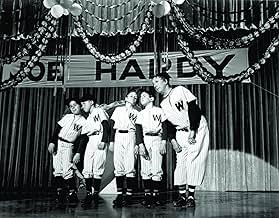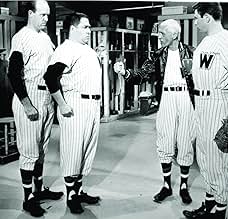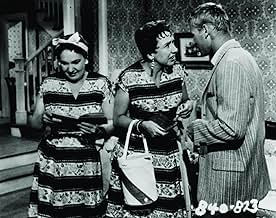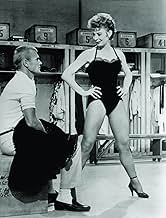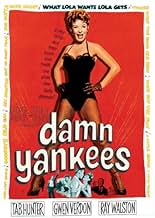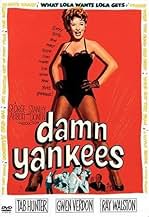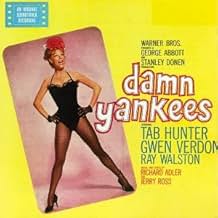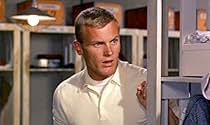CALIFICACIÓN DE IMDb
7.0/10
3.7 k
TU CALIFICACIÓN
Un fanático frustrado de los desesperados senadores de Washington hace un pacto con el diablo para ayudar al equipo de béisbol a ganar el banderín de la liga.Un fanático frustrado de los desesperados senadores de Washington hace un pacto con el diablo para ayudar al equipo de béisbol a ganar el banderín de la liga.Un fanático frustrado de los desesperados senadores de Washington hace un pacto con el diablo para ayudar al equipo de béisbol a ganar el banderín de la liga.
- Dirección
- Guionistas
- Elenco
- Nominado a 1 premio Óscar
- 8 nominaciones en total
Roy Sievers
- Joe Hardy - #2 - Washington Senators
- (material de archivo)
William Adams
- Yankees Team Owner
- (sin créditos)
Phil Arnold
- Newsstand Proprietor
- (sin créditos)
Robert Banas
- Baseball Player
- (sin créditos)
Benjie Bancroft
- Trial Spectator
- (sin créditos)
John Barton
- Baseball Game Spectator
- (sin créditos)
Yogi Berra
- Self - New York Yankee
- (material de archivo)
- (sin créditos)
Opiniones destacadas
This musical, when revived about a decade ago with Jerry Lewis as Applegate, was referred to as a fable for the Eisenhower Years. It is set in a faintly comfortable period (once the McCarthyite Persecutions were finished), because the concept of this musical was the preoccupation of the American public with the national pastime of baseball, and it's singular domination (between 1947 and 1962) by the New York Yankees. Although the Yankees had had other periods of greatness, with Ruth, Gehrig, "Murderers Row" in the late 1920s and early 1930s, they had to share the domination of the World Series with other teams in that period (the Philadelphia Athletics, the Detroit Tigers, and the St. Louis Cardinals, to name three). But the Yankees in this period started with Joe DiMaggio, entered into the period dominated by Mickey Mantel, Whitey Ford, Billy Martin, Yogi Berra, Phil Rizzuto, Don Larsen, Roger Maris, and presided over by Casey Stengel. They did not always win (one memorable defeat was by their perennial enemy the Brooklyn Dodgers in 1955), but they won so often that to non-baseball fans it was monotonous to follow the sports news: you knew what should finally happen.
So the background of this baseball era is important to understand the musical (one of the few times the actual historical background of the time the musical was created becomes that important). Joe Boyd (Robert Shafer) is a fanatical baseball lover and fan of the woebegone Washington Senators (the saying for many years about the Senators was, "First in war, first in peace, and last in their league."). The team had only one great moment: in 1924 they won the World Series when the team had one of baseball's greatest players on it - Walter Johnson. But it never really was in competition again after that. But Boyd is a fan, and he makes the mistake of being willing to sell his soul to allow the Senators a chance to win the series again. Enter Mr. Applegate (a.k.a. the Devil) played fiendishly well by Ray Walston. He offers Joe a contract that will make Joe the greatest baseball player of all time - and lead to the world series - in return for his soul. Hesitant at first, Joe agrees. He is transformed into Joe Hardy (Tab Hunter), and proceeds to try to join the Senators (with Applegate as his agent).
The Devil can never be trusted in any agreement. Applegate hopes to cause a wave of hope and hysteria by the anti-Yankee baseball public, letting Joe lead his team to the World Series. He plans to pull the rug from underneath the team at the final moment. Unfortunately Joe is a good salesman on his own, and has insisted on an escape clause for himself. Applegate has to accept it for the sake of his own plans. The escape clause is there because Joe loves his wife Meg (Sharon Bolin) and does not want her to be hurt. So Applegate decides to recruit his best female agent, Lola (Gwen Vernon) to vamp Joe and make him forget Meg. But Joe is too faithful, and succeeds in overcoming Lola's "irrisistable" personality (as she sings, "Whatever Lola wants, Lola gets" - except here). Lola, shaken by the experience, becomes a type of groupie for Joe - and eventually starts a mini-revolt on her own against Applegate.
The score of the show is memorable. Besides the key song "Heart" (sung by the Washington team players), and Lola's "Whatever" number, there is also "Two Lost Souls", "Goodbye Old Girl" and Walston's wonderful "Those were the good old days!" (when he fondly recalls all the tragedies he created in the history of mankind - including the day Jack the Ripper was born). Walston was not nominated for any awards for the movie performance*, but his Applegate is one of his best film performances, with his Gillis in SOUTH PACIFIC. He had played both on Broadway first, so we are lucky to have his film performances here.
*(But won the Tony Award for the role on stage.)
Stanley Donan co-directed this film with George Abbott. Abbott was usually a stage director (he had done the musical on Broadway). There is a moment when it is apparent that he is directing. There is a small dance done by one of the three ball players in the "Heart" number, and the close-up of the player as he smiles shyly and steps forward is out of place in the film - but would have worked on stage.
So the background of this baseball era is important to understand the musical (one of the few times the actual historical background of the time the musical was created becomes that important). Joe Boyd (Robert Shafer) is a fanatical baseball lover and fan of the woebegone Washington Senators (the saying for many years about the Senators was, "First in war, first in peace, and last in their league."). The team had only one great moment: in 1924 they won the World Series when the team had one of baseball's greatest players on it - Walter Johnson. But it never really was in competition again after that. But Boyd is a fan, and he makes the mistake of being willing to sell his soul to allow the Senators a chance to win the series again. Enter Mr. Applegate (a.k.a. the Devil) played fiendishly well by Ray Walston. He offers Joe a contract that will make Joe the greatest baseball player of all time - and lead to the world series - in return for his soul. Hesitant at first, Joe agrees. He is transformed into Joe Hardy (Tab Hunter), and proceeds to try to join the Senators (with Applegate as his agent).
The Devil can never be trusted in any agreement. Applegate hopes to cause a wave of hope and hysteria by the anti-Yankee baseball public, letting Joe lead his team to the World Series. He plans to pull the rug from underneath the team at the final moment. Unfortunately Joe is a good salesman on his own, and has insisted on an escape clause for himself. Applegate has to accept it for the sake of his own plans. The escape clause is there because Joe loves his wife Meg (Sharon Bolin) and does not want her to be hurt. So Applegate decides to recruit his best female agent, Lola (Gwen Vernon) to vamp Joe and make him forget Meg. But Joe is too faithful, and succeeds in overcoming Lola's "irrisistable" personality (as she sings, "Whatever Lola wants, Lola gets" - except here). Lola, shaken by the experience, becomes a type of groupie for Joe - and eventually starts a mini-revolt on her own against Applegate.
The score of the show is memorable. Besides the key song "Heart" (sung by the Washington team players), and Lola's "Whatever" number, there is also "Two Lost Souls", "Goodbye Old Girl" and Walston's wonderful "Those were the good old days!" (when he fondly recalls all the tragedies he created in the history of mankind - including the day Jack the Ripper was born). Walston was not nominated for any awards for the movie performance*, but his Applegate is one of his best film performances, with his Gillis in SOUTH PACIFIC. He had played both on Broadway first, so we are lucky to have his film performances here.
*(But won the Tony Award for the role on stage.)
Stanley Donan co-directed this film with George Abbott. Abbott was usually a stage director (he had done the musical on Broadway). There is a moment when it is apparent that he is directing. There is a small dance done by one of the three ball players in the "Heart" number, and the close-up of the player as he smiles shyly and steps forward is out of place in the film - but would have worked on stage.
The superb Gwen Verdon sings and dances and mugs through this very good adaptation of the smash Broadway musical. Verdon is a cross between Shirley MacLaine and Carol Burnett with a dash of Carol Haney (another Bob Fosse protégé) tossed in. She's a total delight and one of the best dancers EVER! Here she plays Lola, the temptress used by the devil (Ray Walston) to lure Joe Hardy (Tab Hunter) from going back to his wife and breaking his satanic deal in which middle-aged Joe becomes a 22-year-old baseball star and catapults the Washington Senators to 1st place.
Tab Hunter replaces Stephen Douglass from the Broadway show. The rest of the cast recreates their parts for the movie. Verdon, Walston, and Russ Brown (the manager) all won Tony awards. Hunter seems rather stiff and uncomfortable through much of the film (though he looks great) but that's the part of Joe.... Hunter is, however, just terrific in the "Two Lost Souls" number with Verdon. He sings, dances (not too bad) and seems to be having a ball. Verdon is just astounding in this number and laughs all the way thru it. Great song.
Verdon is also a showstopper in "Whatever Lola Wants" and "A Little Brains, a Little Talent." It seems these songs were written for her and no one else can do them the way she does. Verdon, like Ethel Merman or Carold Channing, was a total original. The voice is slightly nasal; the inflection is odd. But it works. And her dancing is totally awesome.
Ray Walston seems to have been typecast in weirdo roles after Damn Yankees and My Favorite Martian. He was a better actor than these roles allowed him to show. Russ Brown is solid as the manager, Jean Stapleton plays the friend (and sings), Rae Allen is Gloria (the reporter), Shannon Bolin is the wife, Jimmie Komack is the goofy ballplayer, Nathaniel Frey is Smokey, Bob Fosse has a cameo in "Who's Got the Pain," and Robert Shafer plays old Joe.
Good songs by the same team that did The Pajama Game. Many of the songs were hits of the later 50s. My only beef is that most of the songs are truncated (I had the Broadway soundtrack) and at least one "I Thought About the Game" is used only as background music. Verdon's "A Little Brains, a Little Talent" is cut in half as is Bolin's "Six Months Out of Every Year." Certainly worth a look to see Broadway superstar Gwen Verdon in her prime and Tab Hunter at his hunkiest.
Tab Hunter replaces Stephen Douglass from the Broadway show. The rest of the cast recreates their parts for the movie. Verdon, Walston, and Russ Brown (the manager) all won Tony awards. Hunter seems rather stiff and uncomfortable through much of the film (though he looks great) but that's the part of Joe.... Hunter is, however, just terrific in the "Two Lost Souls" number with Verdon. He sings, dances (not too bad) and seems to be having a ball. Verdon is just astounding in this number and laughs all the way thru it. Great song.
Verdon is also a showstopper in "Whatever Lola Wants" and "A Little Brains, a Little Talent." It seems these songs were written for her and no one else can do them the way she does. Verdon, like Ethel Merman or Carold Channing, was a total original. The voice is slightly nasal; the inflection is odd. But it works. And her dancing is totally awesome.
Ray Walston seems to have been typecast in weirdo roles after Damn Yankees and My Favorite Martian. He was a better actor than these roles allowed him to show. Russ Brown is solid as the manager, Jean Stapleton plays the friend (and sings), Rae Allen is Gloria (the reporter), Shannon Bolin is the wife, Jimmie Komack is the goofy ballplayer, Nathaniel Frey is Smokey, Bob Fosse has a cameo in "Who's Got the Pain," and Robert Shafer plays old Joe.
Good songs by the same team that did The Pajama Game. Many of the songs were hits of the later 50s. My only beef is that most of the songs are truncated (I had the Broadway soundtrack) and at least one "I Thought About the Game" is used only as background music. Verdon's "A Little Brains, a Little Talent" is cut in half as is Bolin's "Six Months Out of Every Year." Certainly worth a look to see Broadway superstar Gwen Verdon in her prime and Tab Hunter at his hunkiest.
"Damn Yankees" is old-fashioned entertainment, a bit too talky and literal-minded, but great songs and great dancing never get old. It's worth plodding through the more mundane aspects of this film to relish the classic numbers. "Who's Got The Pain?" has nothing whatsoever to do with the plot, but it proves beyond question that Gwen Verdon is the prime interpreter of the Fosse dance style. "Whatever Lola Wants" is actually rather tame in comparison. The highlight is the smoky, seductive duet "Two Lost Souls," where Verdon lets loose with the greatest of ease. The surprise here is Tab Hunter, who holds his own and handles all the Fosse moves just fine. Jean Stapleton's Sister Miller is an early rehearsal for Edith Bunker. I personally prefer the other George Abbott/Stanley Donen collaboration "The Pajama Game," which is livelier. See them both.
If nothing else, this film version of the hit Broadway play allows viewers to see some of what made Verdon famous. Unfortunately, there isn't a great deal else that's memorable. When retiree Shafer has had his fill of the poorly-playing Washington Senators baseball team, he sells his soul to the Devil (who comes to earth in the human form of Walston) and transforms into a young, super-hitter (Hunter) who can help them win the pennant. He's bright enough to insert an "out clause" in his agreement, so Walston brings up temptress Verdon to make sure he doesn't take that opportunity when the time comes. Meanwhile, Shafer's wife frets over where he's gone, kept company by a pair of flighty sisters who keep their noses firmly planted in everything. In translating this to film (utilizing a larger number than usual of the original cast), the directors somehow managed to dull things down and give the film an aura of stagnation when it ought to be bursting with energy and vitality. Shafer's (purposefully?) drab house, with the planet's ugliest wallpaper, always looks just like a set. Ditto Walston's sparsely furnished lair. The locker room is nearly always filmed from the same angle, as it would have been seen from a theatre audience. Hunter is drop-dead gorgeous with a deep tan, cropped blonde hair and a charming. boyish grin. He is given very little to do, though. He hardly sings, tries to hold his own briefly in a group dance number, and (most dastardly of all) remains fully clothed while other, uglier baseball players take their shirts off or parade in a towel! Even Walston shows more skin than Hunter! Walston puts a lot of details and thought into his, by now, familiar role, but never really comes alive as much as one would like. It's difficult to believe that the Devil would choose this face and body to inhabit on earth. He also has remarkable trouble getting around (taxis?) Verdon (who doesn't even get to show her face until 45 minutes in) is remarkably vivid and captivating with several strong dance numbers. However, she looks far older than her 33 years (sometimes resembling an aged Greer Garson!) and has a surprising lack of chemistry with both Hunter and Walston. Only an idiot would say she's wrong for the part, but she may have been wrong for the film version. Attractive as she is, she just isn't the type of looker that would lure men to their doom. Other cast members include an authentically leathery Linville as the crusty baseball coach, Bolin as Shafer's drab wife, Allen as a loudmouthed reporter and Stapleton doing a head start on her Edith characterization from "All in the Family" and sporting what may be the ugliest hairdo in cinema history. There are a couple of numbers that stand out. One on a baseball field has inventive choreography with lots of dust getting kicked up. Verdon and choreographer (and future husband) Bob Fosse go for it in a variety show mambo. There's also a nightclub sequence with lots of the signature Fosse tableaux and moves. It's interesting to see his style developing and note the roots of his later, even more challenging, work. No one in the film can carry a tune particularly well. Vibrato is unheard of as various singers attempt to hold their shaky notes. Allen sings her entire song under the notes. So many times, viewers complain about films not being faithful to the source musical, but in this case, some more Hollywood tweaking may have helped! Sadly, a lot of gimmicky bits that may have been funny or new in 1958 are rather tiresome now, though it is amusing to see Walston put in coin after coin after coin into a pay phone in order to call Hell.
This is another film which would probably be better rated if it wasn't so slavishly compared to its stage original. It does its job just fine, thank you, but you must remember that stage and film are two different media in terms of what is allowed to be shown to the masses in the first place. In the conservative, postwar 50's there was very little controversy shown (or allowed to be shown) in the film and TV media; a Faustian book made into a film musical probably scared the Hays moral office to death! That said, the Abbott-Donen collaboration does a more than competent job of telling the story, and scores an extra base hit in my opinion by retaining most of the Broadway cast of the show in the first place. The casting rumors are legendary: I've read that the studio tried to get Cyd Charisse and possibly even Marilyn Monroe for Lola (assuring box-office returns), but the producers were smart enough to know that the role needed a real dancer-singer-actress combination. In short, it needed Gwen Verdon exclusively. And it got her. If you're still not convinced, take a second look at the exquisite midnight cafe' number, "Two Lost Souls."
¿Sabías que…?
- TriviaGwen Verdon's dance partner in "Who's Got the Pain?" is Bob Fosse, who was restaging his stage choreography for the film, and took the opportunity to step into the number, which became a rare and treasured opportunity for Broadway fans to see the artist and his muse perform together. Verdon and Fosse married in 1960.
- ErroresWhen Joe is introduced to the manager and the reporter at the ballpark, there is a palm tree in the background, although the scene takes place in Washington DC.
- ConexionesFeatured in Diamonds on the Silver Screen (1992)
- Bandas sonorasSix Months Out of Every Year
Music by Richard Adler
Lyrics by Jerry Ross
Performed by Shannon Bolin, Robert Shafer, and chorus
Selecciones populares
Inicia sesión para calificar y agrega a la lista de videos para obtener recomendaciones personalizadas
- How long is Damn Yankees?Con tecnología de Alexa
Detalles
- Fecha de lanzamiento
- País de origen
- Idioma
- También se conoce como
- Damn Yankees
- Locaciones de filmación
- Productoras
- Ver más créditos de la compañía en IMDbPro
- Tiempo de ejecución
- 1h 51min(111 min)
- Relación de aspecto
- 1.85 : 1
Contribuir a esta página
Sugiere una edición o agrega el contenido que falta


